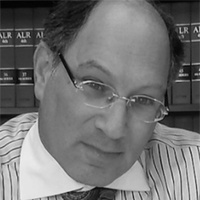 Odenton Criminal Lawyers, Maryland
Odenton Criminal Lawyers, Maryland
Sponsored Law Firm
-
 x
x

Click For More Info:
-
Isaac Klein Attorney at Law
1 N Charles Street Suite 350 Baltimore, MD 21201» view mapAccident & Injury Law You Need Isaac To Defend You!
Issac Klein has been serving the citizens of Maryland since opening his practice in 1982. If your claim cannot be settled for a fair amount, he can prepare to file suit and go to trial.
800-768-4560
Sponsored Lawyers
1-5 of 5 matches
Divorce & Family Law, Criminal, Motor Vehicle, Accident & Injury, Employment
Mr. Roper firmly believes in the diverse skill set he offers his clients: a compassionate and caring attorney attentive to each detail of his client’s case while at the same time an aggressive litigator who is not afraid to take the gloves off to fight for the rights of his clients. Mr. Roper prides himself on providing the best representation to every one of his clients and works tirelessly to vigorously protect and maximize their interests. Driven to make the law work to his client’s advantage, he has successfully completed the rigorous National Institute of Trial Advocacy Trial Skills Program in Boulder, Colorado. Mr. Roper has also participated in the National Legal Aid Defenders Association National Law Conference in Chicago, Illinois and the Stalking Resource Center National Law Conference in St. Louis, Missouri. Prior to becoming owner and partner of Roper & DiBlasio, LLC, Mr. Roper was employed as an attorney with Staiti & DiBlasio, LLP. Mr. Roper has also served as a Staff Attorney for the Sexual Assault/Spousal Abuse Resource Center Legal Services Program where he fought for vulnerable victims. Mr. Roper also served as Judicial Law Clerk for the Honorable Stephen M. Waldron, the senior trial Judge on the Circuit Court for Harford County, and interned for the Honorable Clayton Greene, Jr. for the Court of Appeals of Maryland in Annapolis. Mr. Roper has also worked for the Law Offices of Bruce A. Johnson, Jr., LLC, the Law Office of Patricia Cleary, LLC, and interned with the Public Defender’s Office of Baltimore County.
(more)


 Isaac Klein Baltimore, MD
Isaac Klein Baltimore, MD Practice AreasExpertise
Practice AreasExpertise

